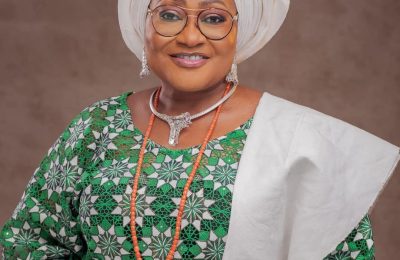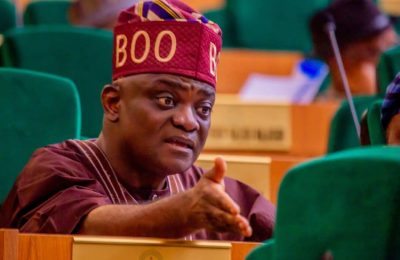The presidential candidate of the Social Democratic Party (SDP) in the 2023 general elections, Prince Adewole Adebayo, in this interview, shares his views on the comment made by former President Olusegun Obasanjo with an appraisal of the economic policies of President Bola Tinubu and its negative effects on Nigerians.

Recently, former President Olusegun Obasanjo advised the government to change their economic policies as they are adversely affecting livelihood in Nigeria. What are your views about his comments?
Obassnjo’s comment is right in some parts. With due respect to Obasanjo, I have two problems with his intervention. Don’t criticise somebody over something you have done before because they won’t listen to you; they would say you did the same thing. Secondly, if you change your mind because we learn every day, if you change your mind about some things you did in the past, you can tell the younger one that I made a mistake in my time for not reforming the Independent National Electoral Commission (INEC). I made a mistake in selling all these institutions that I sold, including NEPA, NITEL and Nigeria Airways among others. You shouldn’t have sold them away because without that you cannot generate employment and run the economy. For example, why would you sell the Nigerian Airways? Was it because they didn’t have aircraft? Are aircraft the real money? The real money of Nigeria Airways was the BASA agreement with billions of dollars. Even if you had no single aircraft, the fact that they had the right to fly to Brazil, America and different parts of the world was enough money on its own. All over the world, airliners are looking for places where you have the right to fly to, but he is no longer in government now. But he can come, keep the hypocrisy aside because hypocrites can still be right.
The person who doesn’t take a shower regularly can still tell you, you haven’t taken a shower today. He is correct.
So, what part of Obasanjo’s comment was correct?
Yes, the state capture is correct. He gave a beautiful lecture at Yale University during the Chinua Achebe lecture. It was a perfect lecture. The only difference he should have said was I, together with them, we did state capture. The fact is that state capture was done truly and if one of the participants is confessing, I don’t think we should interfere. But, the lesson to learn in that discussion is that if former President Obasanjo can be talking like this, it means that he is now looking from outside at that thing I used to do which I didn’t know the effect of, these people are now carrying it on and now we must all stop it. If a person used to be a smoker, he is criticising you that you are smoking now, it is because you were smoking when you were younger. That doesn’t mean smoking is good.
The bottom line is that the direction we have been taking since 1999 is not the right direction and that is why we have been having bad results. The difference is that Obasanjo had efficiency. Obasanjo knows how to govern even when he has a bad policy. He had the presence of mind to govern, compared to those who are there now who don’t have the presence of mind to govern. Obasanjo had the time to consult, he has the ability to explain; he was not too afraid of bringing talents to his government. That doesn’t mean you will agree with him on all his policies. After all, if he was successful, many of the problems the subsequent administrations met on the ground wouldn’t have been met. But that doesn’t disqualify him from pointing out what is wrong. More so, he has been in that office a number of times. Even if you are doing what he has done before, that is not an excuse.
What is your perspective on the current economic situation of the country?
The situation of Nigerians is predictably bad. They are where we said they would be. Luckily, they are not as bad as we feared, given the policy options adopted, the mentality and attitude to governance adopted by many of the political parties and contestants, one of whom is now our President and Commander-in-Chief. So, there is that cavalier attitude where they will not discuss policies and just assert their entitlement because they have been in politics for a long time, and their friends are everywhere. They believe that when they come in, they will have access to patronage of power. Is it my religion or yours? Is it your tribe or mine? Is it my zone or your zone? Those things don’t impact the lives of the people and they don’t power the ship of state. But, those were the issues that were dominant during the election.
Even now, to get policy-rich issues into the mainstream, you will get comments by former this and that. Even when they don’t have policy disagreements, they will still have what the late Fela Anikukapo used to call ‘Yabis night’ at the shrine in those days. What the Nigerian political class has turned the entire four years to is ‘Yabis years.’ They just come, say what you like, and whether it is consistent with what you have done all your life doesn’t matter. Just say anything; whatever cheap shot you can throw and at the end of the day, no policy is implemented. Remember there are four pillars of governance that you can use in knowing if the military and security agencies are effective. When life and property are safe, governance is taking place even if the president doesn’t talk. If the civil servants are delivering on services and they are meeting their targets; if people have better electricity, better healthcare; if the rule of law is working through the judiciary; if the industry is working, and industry this time, is in two branches -professional like lawyers, nurses, and productive industry like manufacturing, agriculture, and extractive industry; if those ones are working, whether people like your face or not, the evidence will be clear.
The International Monetary Fund (IMF) is also kicking against the government policies, saying they are not working; what is your take on that?
The IMF isn’t saying what we are saying. We are saying that the policies of the government don’t fit into our socio-economic situation, as they don’t address our needs but the IMF is saying that the government is not punishing us enough because they have not been able to get enough consensus for deeper reforms. The IMF is calling you a resource-intensive country. They change their language every time because they change consultants who use new words for them.
They are saying that we are oil export-dependent, and as a result of that, we are not able to do the kind of reforms they want. They said that because we fall into the bracket of people who used between two and five percent of their revenue to pay interest on loans, they see it as stress. But, none of the indices deals with the problems we have in the country. If you keep amplifying what the IMF is saying and you put pressure on the government to react to meet up with the IMF’s standard, things would be worse because the errors they are committing now will make them commit more.
What would you have done differently?
What I would have done was to form a government; they haven’t done that till this day.
Are you saying they haven’t formed a government?
Yes, they have not. For example, naming three spokespersons for one-man shows that they are just announcing names. You need to gather all the talents in the country; that should be your first duty. We have a problem in our constitution, which says that only one man is the government. Section 5 of the constitution says all executive powers are vested in the government. If you want to talk about the government today, you can only talk about President Bola Tinubu. He is the only one lawfully in government.
What would you have done in terms of economic policies?
For the policy to be adopted, one is security. There is a linkage between security and economics. If you must deal with inflation, you must provide food for the people. Therefore, you need to do some agriculture. That means you need to be in charge of the land around the country.
Secondly, you need to find a way to employ people. There are three ways to employ people. One of them is to spend the money you have on social investment. It’s in the news that about N123 billion of the UBEC money has not been accessed by states. That means if they have it, more children will be in school. You will be able to hire more teachers, and the teachers will have to pay for food and accommodation, and you grow the economy from there.
The government does three things when you are in charge of the economy. You control the government’s spending at the federal level. You control subsidiary spending at state and local government levels. You control private sector spending because people will align their own investments to what the government policy is.
ALSO READ TOP STORIES FROM NIGERIAN TRIBUNE







